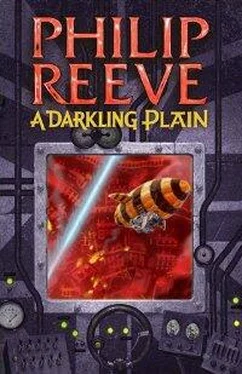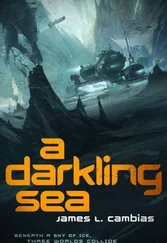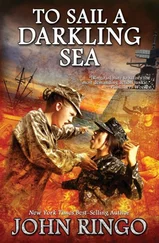Wolf laughed, pleased by her show of bravery. “I like you, Wren! There are no girls in Murnau who would make a journey like this and stay so cool about it. You are—how would you say it—cold-blooded.”
“Must take after my mum,” said Wren.
“Not far now,” Tom announced, as he started the engines that night. Wren had gone aft to catch up on her sleep in the stern cabin, but Wolf was pacing the flight deck, pausing from time to time to stare out over the control panels into the blackness ahead, waiting impatiently for a glimpse of London. “We’re close,” he said softly, as if to himself. “We’re very close now…”
Sails of dried mud thrown up by London’s tracks blotted out the night sky. Twice the sounds of the engines woke birds, which came flapping past the gondola windows and startled Tom. The second time he cried out, and brought Wolf springing to his side.
“It’s all right,” Tom said sheepishly. “Nothing. Just birds. I was in a fight with the Storm’s flying Stalkers, years ago. I’ve been nervous of birds ever since.”
“You’re a brave man, Herr Natsworthy,” said Wolf, relaxing, going back to his pacing.
“Brave?” Tom laughed. “Look at me. I’m shaking like a leaf!”
“Even brave men feel fear. And the things you’ve done … Wren has told me some of the wonderful adventures you had when you were young.”
“They didn’t feel wonderful at the time,” said Tom. “I was just scared stiff, mostly. It was only luck that brought me through alive. Every time I tried to do anything, it all went wrong…”
They flew on. After a few hours Wren relieved Tom at the controls. He switched on the coffee machine and shook Wolf, who was dozing on the window seat. “Coffee?”
The young man frowned. “What time is it? Are we at the debris fields?”
“Not yet.”
“Dad?” said Wren from the pilot’s seat. “Dad, look!”
Forgetting the coffee, Tom went to stand beside his daughter, leaning over the banks of control levers to peer out through the nose windows. The sky was pale, the first hint of dawn starting to show behind the distant mountains. Closer than the mountains, black against the sky, stood a squat, windowless tower, blocking the track mark ahead. For a panicky instant Tom wondered if the Green Storm had built a fortress here to guard the wreck of London.
“It’s a wheel,” whispered Wolf, staring over Wren’s shoulder, fascinated.
As Wren eased the steering levers back and the Jenny rose, and the rounded thing slid by beneath her, Tom saw that the other man was right; it was buckled, corroding, shaggy with weeds, but unmistakably one of London’s wheels. Beyond it the Out-Country mud was strewn with immense, dark shapes; more wheels, lengths of twisted axle, strange melted masses of metal flung out from the exploding city. Cast-off tracks were strewn across it all, like ruined roadways leading toward the mountain of scrap that was just coming into view through the mist ahead.
Tom held his breath. He remembered the last time he had seen London, blazing and wracked by explosions, on the morning after MEDUSA. Hester had been with him then; they had been cast adrift together in the Jenny, and she had comforted him, and made him turn away from the sight of his dying city. By the time he had looked again, the wind had blown them far from London.
“Do you want to land?” asked Wren.
Tom rubbed a hand quickly across his eyes and looked at Wolf. Wolf said, “Not yet. This is just the western edge of the debris fields. Nothing here but wheels and tracks and a few burned-out suburbs that came looking for salvage and got bombed by the Anti-Traction League…”
“Or blasted by the ghost lights,” joked Wren, and then wished she hadn’t, because the silly ghost stories she had heard in Moon’s did not seem silly at all now. The silent wreckage of London was slipping past on either side of the gondola: empty-windowed husks of broken buildings looming out of the night like a fleet of ghost ships.
“We’ll head eastward for a bit,” Tom decided.
The landscape beneath the Jenny Haniver was altering quickly. Soon she reached the main debris field, where the earth was completely hidden by deep, dense heaps of tangled scrap. She passed over a burned-out suburb, wheels and engine array dissolving into the greater ruin of the city it had come to feast on. Trees stirred softly in the clefts between steep-tilted jags of deck plate. Ahead the wreckage heaped upward into spiny hills. Tom sighted a flat place, half-hidden by the overhanging plates of a sloughed-off track, circled back to check it, and set the Jenny down quietly and carefully in the shadows there.
“Gosh!” whispered Wren in the silence that closed in once Tom had killed the engines.
Wolf Kobold opened the hatch, letting in cold, moist air and a smell of wet earth. “Nobody about,” he said. “No welcoming committee…”
Tom could feel his heart pounding. He struggled to calm himself. Furtively swallowing one of his green pills, he found an excuse to stay on the flight deck while Kobold and Wren busied themselves outside, tethering the Jenny securely with landing anchors and draping her engine pods and steering fins with the camouflage netting he had brought from Murnau. She was too big to hide, but with luck passing airships or Stalker-birds would miss her, tucked into that rusty cave of track plates with the netting softening her outlines.
They gathered the things they needed: their canvas packs; lanterns; the old gun that Tom had never used, taken down from the locker above his pilot’s chair. Outside, the sky above the debris fields was turning gray, stars fading as the dawn approached. They drank tea, and Wolf took a nip of something stronger from his hip flask.
“Perhaps you should stay here with the ship, Wren,” Tom suggested. “At least until we’ve had a look around…”
“We should stick together,” said Wolf firmly, and no one disagreed; they were on the ground again now, back in his realm, and they let him go ahead, a flashlight in one hand and his pistol in the other, as they stepped out one by one into the shadows of the lost city.
It seemed silent at first. An eerie, awful, graveyard silence, broken only by the footfalls of the newcomers. The white gardens of the Moon must be this quiet, thought Tom. But gradually, as they picked their way along the narrow, aimless tracks, he became aware of small sounds. Drips of water pattered down from overhangs; a scrap of curtain flapped in an empty window; flakes of rust shifted and stirred, piled in deep drifts among the hollows of the wreckage.
“No one about,” muttered Wolf.
“How does it feel to be home, Dad?” asked Wren.
“Strange.” Tom stooped to run his fingers over a buckled metal sign that lay among the rust scraps underfoot, tracing the familiar name of a London street; FINCHLEY ROAD, TIER FOUR. “Strange and sad…”
“Quiet,” warned Wolf, standing a little ahead of the others, watchful, his gun in his hand.
“If there’s anyone here, they must have heard the Jenny’s engines when we set down,” Tom reminded him. “They know we’ve arrived. I wish they’d show themselves…”
A bird cried, away in the ruins somewhere. They pressed on eastward, pulling on their goggles to shield their eyes against the peach-colored glare of the rising sun. The debris fields had looked big from the windows of the Jenny Haniver, but from ground level they were simply vast. London was another country; a mountainous island whose central peaks stood several hundred feet high. Parts of the wreck were still recognizably the remains of a city; there were whole streets of empty-eyed buildings, and a row of upside-down shops with the fading, blistered signs still in place above—now below—their doors. But in other sections everything was so twisted, so jumbled up, so distorted that it was hard to say what it had been before MEDUSA. And twice, among the enormous heaps of rust, Tom made out subsidiary wrecks; the carcasses of suburbs. He remembered hearing in Murnau about suburbs that had gone to tear salvage from the wreck soon after it fell, and had never come back because the Anti-Traction League had bombed them. But these suburbs, deep in the ruins, one with its jaws still clamped around some tasty mass of scrap, did not show the scars of any bomb or rocket blasts. It looked to Tom as if the reason they had never gone home was because they had melted.
Читать дальше












